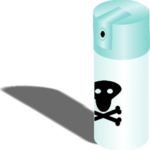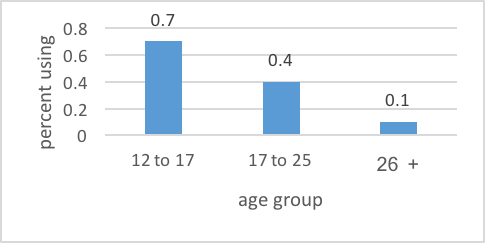Main Body
Ch. 5: Introducing Inhalants
 The topic of inhalant misuse is next on our list. Inhalant misuse potentially includes a wide variety of chemicals: nitrous oxide, cleaning fluids, gasoline, spray paint, computer keyboard cleaner, felt-tip pens, glues/adhesive sprays, and other aerosol products. Turning to our 2015 NSDUH survey, over a half-million persons aged 12 and older currently (during the past-month) use inhalants—the majority being adolescents aged 12-7 years (see Figure 2). Overall, about 0.2 percent of the population aged 12 and over are estimated to currently use inhalants—so it is not as commonly used as many of the other substances we are studying, but has a tremendously disruptive and destructive potential.
The topic of inhalant misuse is next on our list. Inhalant misuse potentially includes a wide variety of chemicals: nitrous oxide, cleaning fluids, gasoline, spray paint, computer keyboard cleaner, felt-tip pens, glues/adhesive sprays, and other aerosol products. Turning to our 2015 NSDUH survey, over a half-million persons aged 12 and older currently (during the past-month) use inhalants—the majority being adolescents aged 12-7 years (see Figure 2). Overall, about 0.2 percent of the population aged 12 and over are estimated to currently use inhalants—so it is not as commonly used as many of the other substances we are studying, but has a tremendously disruptive and destructive potential.
Figure 2. Past month inhalant use by age group (percentage)*

*adapted from NSDUH, 2015 data report (SAMHSA, 2016)
Our reading for this chapter comes again from the National Institute on Drug Abuse (2017) Drug Facts series. In this reading you will learn:
- What the class of inhalants are and how they are misused
- Effects on the brain and other organ systems of inhalant misuse
- The deadliness of inhalants
Click here for a link to our Carmen course where you can locate the assigned pdf file(s) for this chapter. You will need to be logged into our Carmen course, select Module 12, and proceed to the Coursework area. Under the Readings heading you will find a box with links to the readings for relevant coursebook chapters. Don’t forget to return here in your coursebook to complete the remaining chapters and interactive activities.

How would you explain the problem of inhalant use to a group of middle school students’ and their parents, perhaps as a Boy/Girl Scout presentation?

